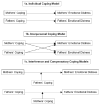Mothers and fathers coping with their children's cancer: Individual and interpersonal processes
- PMID: 25622077
- PMCID: PMC4671390
- DOI: 10.1037/hea0000202
Mothers and fathers coping with their children's cancer: Individual and interpersonal processes
Abstract
Objective: To examine individual and interpersonal processes of coping and emotional distress in a sample of mothers and fathers of children with recently diagnosed cancer.
Method: A sample of 317 mothers and 166 fathers of 334 children were recruited near the time of the child's cancer diagnosis or relapse (M = 1.4 months, SD = 1.2). Mothers and fathers completed standardized measures of coping and depressive symptoms.
Results: Analyses of individual coping responses revealed that, for both mothers and fathers, primary control coping (e.g., problem solving, emotional modulation) and secondary control coping (e.g., acceptance, cognitive reappraisal) were associated with lower depressive symptoms. Interpersonal analyses of coping and distress indicated that mothers' and fathers' coping as well as depressive symptoms were significantly correlated. Actor-partner interdependence model analyses indicated that mothers' coping was associated with fathers' depressive symptoms. Significant interactions also suggested that mothers' secondary control coping may have a compensatory effect against fathers' use of disengagement coping, both for themselves and their husbands.
Conclusion: Mothers' and fathers' adaptation to a child's cancer diagnosis and treatment are characterized by both individual and interpersonal processes, with secondary control coping playing a central role in both of these processes. Implications for interventions to enhance effective coping for parents of children with cancer are highlighted.
(c) 2015 APA, all rights reserved).
Figures



Similar articles
-
Does fathers' and mothers' rumination predict emotional symptoms in their children?Br J Clin Psychol. 2017 Nov;56(4):431-442. doi: 10.1111/bjc.12148. Epub 2017 Aug 14. Br J Clin Psychol. 2017. PMID: 28805254
-
Parent Couples' Coping Resources and Involvement in their Children's Intervention Program.J Deaf Stud Deaf Educ. 2018 Jul 1;23(3):189-199. doi: 10.1093/deafed/eny011. J Deaf Stud Deaf Educ. 2018. PMID: 29672722
-
Mothers' and fathers' responses to their child's pain moderate the relationship between the child's pain catastrophizing and disability.Pain. 2011 Apr;152(4):786-793. doi: 10.1016/j.pain.2010.12.010. Epub 2011 Jan 26. Pain. 2011. PMID: 21272996
-
A longitudinal study of Latino and non-Hispanic mothers' and fathers' depressive symptoms and its association with parent-child communication.J Affect Disord. 2018 Feb;227:580-587. doi: 10.1016/j.jad.2017.10.046. Epub 2017 Oct 31. J Affect Disord. 2018. PMID: 29172050 Free PMC article. Review.
-
Experiences of fathers of children with a life-limiting condition: a systematic review and qualitative synthesis.BMJ Support Palliat Care. 2023 Mar;13(1):15-26. doi: 10.1136/bmjspcare-2021-003019. Epub 2021 Jun 17. BMJ Support Palliat Care. 2023. PMID: 34140322 Free PMC article.
Cited by
-
Maternal Coping and Depressive Symptoms as Predictors of Mother-Child Communication About a Child's Cancer.J Pediatr Psychol. 2016 Apr;41(3):329-39. doi: 10.1093/jpepsy/jsv106. Epub 2015 Nov 25. J Pediatr Psychol. 2016. PMID: 26609183 Free PMC article.
-
Cancer-related stress in childhood cancer survivorship: Prevalence and associations with perceptions of health risks and quality of life.Psychooncology. 2024 Jan;33(1):e6253. doi: 10.1002/pon.6253. Epub 2023 Nov 27. Psychooncology. 2024. PMID: 38009605 Free PMC article.
-
The perceived influence of childhood cancer on the parents' relationship.Psychooncology. 2017 Dec;26(12):2109-2117. doi: 10.1002/pon.4313. Epub 2016 Dec 15. Psychooncology. 2017. PMID: 27859953 Free PMC article.
-
Problem-solving skills, parent-adolescent communication, dyadic functioning, and distress among adolescents with cancer.Pediatr Blood Cancer. 2018 May;65(5):e26951. doi: 10.1002/pbc.26951. Epub 2018 Jan 9. Pediatr Blood Cancer. 2018. PMID: 29316232 Free PMC article.
-
Longitudinal associations among maternal depressive symptoms, child emotional caretaking, and anxious/depressed symptoms in pediatric cancer.J Fam Psychol. 2018 Dec;32(8):1087-1096. doi: 10.1037/fam0000463. Epub 2018 Sep 13. J Fam Psychol. 2018. PMID: 30211572 Free PMC article.
References
-
- Aiken LS, West SG. Multiple regression: Testing and interpreting interactions. Newbury Park, CA: Sage; 1991.
-
- Aldao A, Nolen-Hoeksema S. When are adaptive strategies most predictive of psychopathology? Journal of Abnormal Psychology. 2012;121:276–281. http://dx.doi.org/10.1037/a0023598. - DOI - PubMed
-
- Askins MA, Sahler OJZ, Sherman SA, Fairclough DL, Butler RW, Katz ER, Phipps S. Report from a multi-institutional randomized clinical trial examining computer-assisted problem-solving skills training for English- and Spanish-speaking mothers of children with newly diagnosed cancer. Journal of Pediatric Psychology. 2009;34:551–563. http://dx.doi.org/10.1093/jpepsy/jsn124. - DOI - PMC - PubMed
-
- Beck AT, Steer RA, Brown GK. Beck Depression Inventory manual. 2. San Antonio, TX: Psychological Corporation; 1996.
-
- Bennett Murphy LM, Flowers S, McNamara KA, Young-Saleme T. Fathers of children with cancer: Involvement, coping, and adjustment. Journal of Pediatric Health Care. 2008;22:182–189. http://dx.doi.org/10.1016/j.pedhc.2007.06.003. - DOI - PubMed
Publication types
MeSH terms
Grants and funding
LinkOut - more resources
Full Text Sources
Other Literature Sources
Medical

